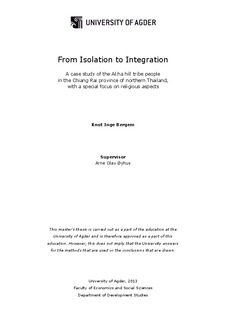From isolation to integration : a case study of the Akha hill tribe people in the Chiang Rai province of Northern Thailand, with a special focus on religious aspects
Master thesis
Permanent lenke
http://hdl.handle.net/11250/194170Utgivelsesdato
2013Metadata
Vis full innførselSamlinger
Sammendrag
Many societies are today challenged because of migratory movements. Diversity of cultural,
social and religious traditions may create conflicts of interests and authorities are forced to
develop comprehensive integration policies. Thailand has experienced an influx of migrants
from neighbouring countries during the last decades. Many of these migrants are
disadvantaged tribal people, wanting to integrate into their new home country. This study has
been focusing on the integration process for Akha hill tribe people in the province of Chiang
Rai in northern Thailand. The main objectives have been to look into socio-political and
religious factors that affect the integration process for the minority Akha hill tribe people into
the majority Thai society.
Authorities in Thailand are conducting a typical assimilative integration policy, meaning that
the focus is on how the migratory tribal people have to adapt to the existing majority society.
The ambition from the Thai Government may be seen as creating a cultural homogenous
nation, that expect migratory tribal people to give up their distinctive culture and traditions
(IOM, 2011:131).
The findings from this study revealed that there are important political factors that complicate
and hinder a good integration process for tribal people into the Thai society. These are
especially issues related to citizenship and legal rights. Secondly, the study found a lack of
acceptance and a high degree of prejudices from ethnic Thai people towards tribal people in
Thailand. The reasons for this were mostly connected to social and cultural factors both in the
major Thai society and in the minor tribal societies. Finally, the study revealed that religious
factors also have had and still have great impacts on the integration process. Practicing tribal
religion and not the dominant Buddhist religion creates fractions between ethnic Thai people
and tribal people. Christian activities have amongst other given many tribal children the
opportunity to obtain good education, which in this study was found to be a key factor for
acceptance and enhanced integration of tribal people into the Thai society.
Beskrivelse
Master thesis Development management- University of Agder 2013
